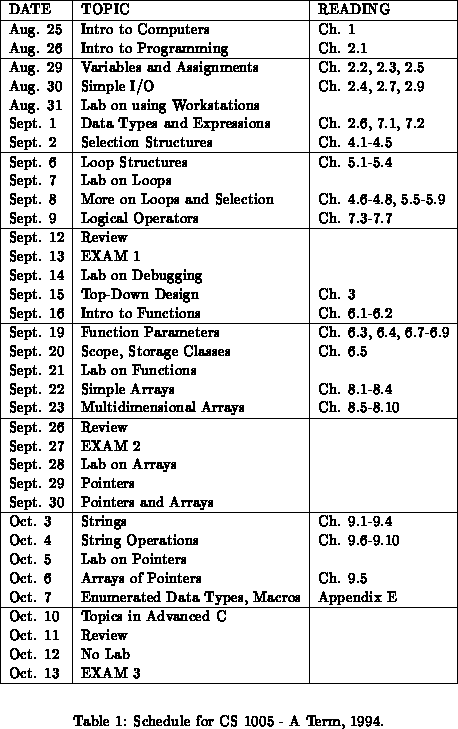



CS1005 - A Term, 1994
Introduction to Programming in C
Lectures: AK-116, MTTF 10:00 - 11:00
Labs: FL-B11, Wednesday at various times
Instructor: Prof. Matthew Ward, FL-134, 831-5671, matt@cs
Office Hours: Monday and Thursday: 11AM, Tuesday and Friday: 1:30PM,
Others by appointment
Teaching Assistants:
Pete Bastien, FL-145, 831-5118, ptbast@cs, Office hours M9, T11, W6, Th7, F12:30
Chris Bentley, FL-140, 831-5004, chrisb@cs, Office hours M12:30, T12:30, W7, Th12:30, F9
Ming He, FL-239, 831-5005, mhe@cs, Office hours M1:30, M7, T2:30, Th1:30, F2:30
Course Objectives:
Upon completion of this course, the student should possess a good understanding of structured computer programming in general, and should be moderately fluent in the syntax and semantics of a significant portion of the C programming language. Students desiring an exposure to more advanced topics in C programming are encouraged to take CS2005 after this course.
Course Description:
I have also placed several other books on C Programming on reserve in the library to assist students who are still fuzzy on a particular topic after attending class and reading their text book.
DecStations are available FL-B11, CCC, and other labs across the campus. Hours of availability differ. Programs may be developed on PCs; however, the assignments must be turned in and fully functional on the workstations. If you are doing the coursework on a PC and you need help from me or the TAs with your program, please transfer the program to the workstation environment (and try compiling it there) before coming to us, as this makes it easier for us to examine your code and insures that the problem is not with your PC.
If you are having difficulty understanding a concept, designing your program, or finding a bug, do not hesitate in contacting either me or the TAs (this is why we have office hours!). If the problem occurs at an odd hour or you cannot get to one of our office hours, the next best solution is to send electronic mail to us. This can be done individually at the addresses above. We each check our e-mail several times a day, so chances are you would get a response fairly quickly. For help using electronic mail, check the CCC Handbook or see one of us. You should try to read your e-mail every day, as we will broadcast useful information on a regular basis to the class.
Cheating:
Academic Dishonesty, as stated in the student handbook, is a ``willful act that interferes with the process of evaluation by misrepresentation of the relation between the work being evaluated (or the resulting evaluation) and the student's actual state of knowledge.'' Thus, copying someone else's code (or exam), sneaking notes into an exam, or getting someone else to write all or a significant part of your code each constitute cheating. This does not mean that you cannot ask a fellow student a question regarding such things as understanding the assignment, a particular C language construct, or an error message you are receiving. Just make sure that what you hand in is your work alone. Any student found guilty of academic dishonesty will receive a 0 grade for the particular assignment or exam and the CS department head will be notified. A second incident will result in a failing grade for the course and other actions (which may lead to expulsion) as specified in the student handbook. Bottom line? Don't cheat - if you are having troubles, come see me or one of the TAs.



